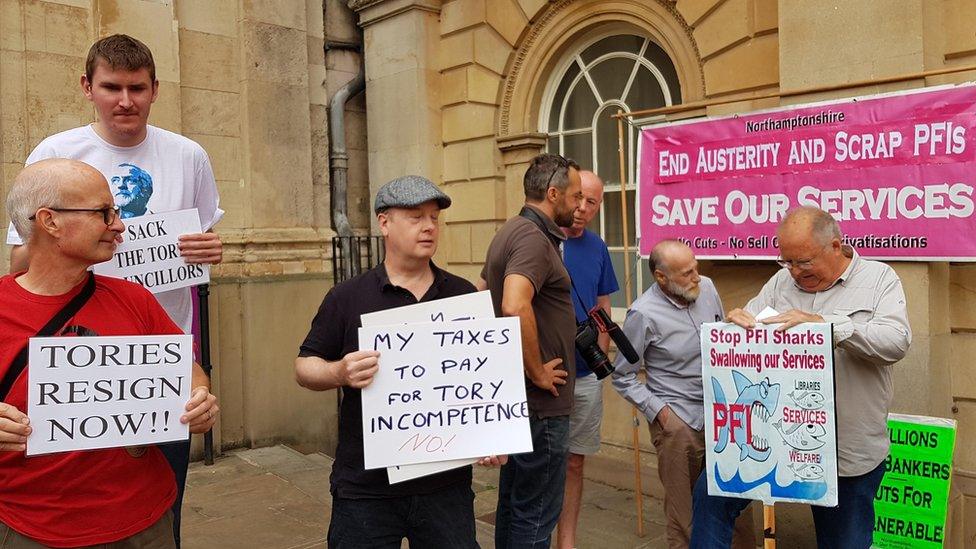Northamptonshire County Council: What you need to know about the cash crisis
- Published

Under Northamptonshire County Council's draft budget proposals for 2019-20, the authority will continue to manage 14 libraries and support five, but the remaining 17 will be community-led following protests at plans to close them
Northamptonshire County Council has been called "the worst run" local authority in the country and accused of weak budgetary control. Money problems saw it ban all but essential spending twice last year and the council is set to be closed and replaced in 2020. But how did we get here - and what happens next?
What does the county council do?
It looks after services including education, social services, libraries, public transport and gritting roads.
Why is it in trouble?
The authority has overspent its budget by millions of pounds, forcing it to twice stop all non-essential spending in 2018.
As of 6 February, it is facing a deficit of £1.4m on this year's budget. In 2019-20 the council plans to make £41.4m in savings.
What will happen next?
From 2020, it is planned that the council will no longer exist. It is due to be scrapped, along with seven other district and borough councils in Northamptonshire, to make way for two new unitary authorities.

People unhappy at planned cuts to services have protested outside some of the council's offices
How is the council planning to save money?
By making cuts to services it provides, and by managing its finances better. Children's services, road maintenance and waste management are among the areas that will be affected at the Conservative-led council.
The government has also given the county council permission to spend £70m in so-called capital receipts; funds raised by selling off council-owned buildings or assets. It's hoped that money can pay off existing debt and restore the council's depleted reserve funds.
What does this mean for people in Northamptonshire?
Plans are still being finalised but hundreds of roads have not been gritted during the winter, saving £475,000. Several libraries will also be taken over by the community in a bid to keep them open.
The government has also given the council permission to raise council tax by 5%.
Are vulnerable people at risk?
One recent - and critical - report suggests that they could be. In November, a letter from Ofsted to the council's chief executive said social workers were "overwhelmed" and "drowning". A government commissioner has been brought in to oversee the changes after Ofsted ruled that youngsters were being put "at risk".
People in Northampton give their verdict on the council's financial crisis
How have the council's finances been allowed to get so bad and who is to blame?
This hasn't happened overnight, but in 2015 the council's former finance director Matt Bowmer warned the authority had a "culture and behaviour where overspending is acceptable".
He wrote to the council's ex-chief executive Dr Paul Blantern, council leader Jim Harker and cabinet member for finance Bill Parker after the authority overspent by £43m in the first seven months of that year. He called for the authority to halt all non-essential spending - known as a section 114 notice - but his request was ignored.
The council blamed "unfair" government funding for its money issues before eventually banning spending last February.
Who is trying to sort this out?
Theresa Grant joined the council as chief executive in July in order to "balance the books". She is the third person to take on the role in a year, after interim chief executives Andrew Quincey and Damon Lawrenson resigned.
Three government-appointed commissioners will also oversee the council.
Are any other English councils at risk?
Some - including Somerset and Lancashire county councils, and Birmingham City Council - have shown signs of "financial distress", although none is at the same point as Northamptonshire.
Official data shows that in 2016-17, one in three councils spent more than they originally planned. Kettering MP Philip Hollobone said Northamptonshire had become "the worst run in the country".
Are 2019's local elections for Northamptonshire affected?
Yes. In November, Communities Secretary James Brokenshire said that local elections in Northamptonshire would be postponed. Mr Brokenshire said elections were a "foundation of democracy", but in Northamptonshire's case would "involve significant costs that would be hard to justify". No new date for the local elections has been announced.

The council sold its new multi-million pound HQ - One Angel Square - to aid its budget problems
- Published29 January 2019

- Published3 December 2018

- Published13 November 2018
